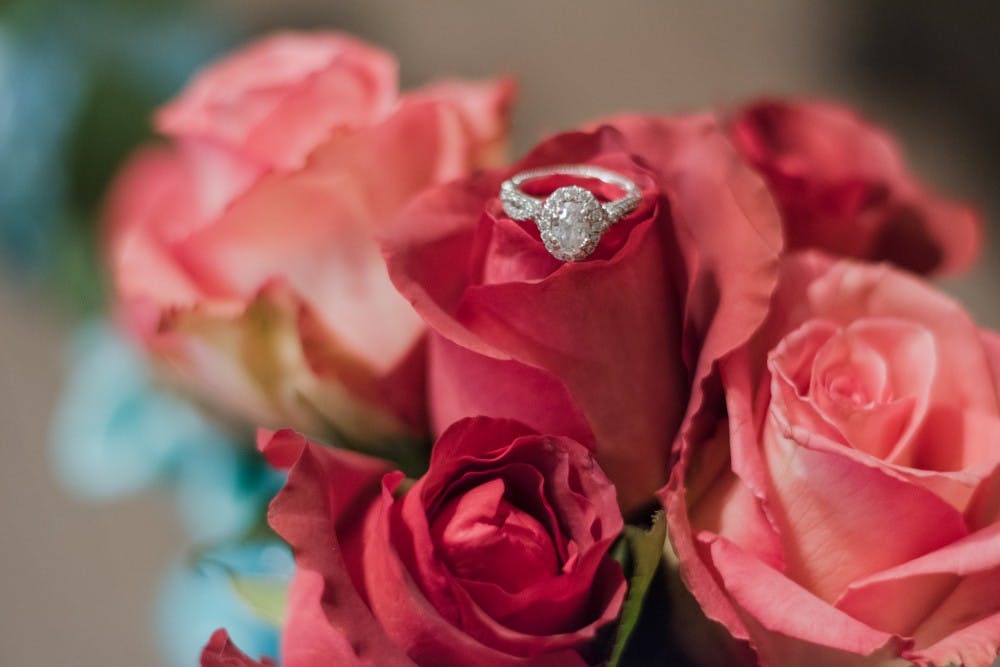Since Auburn University opened its male-only doors to women in 1892, many students—men and women alike—have tirelessly pursued the idea that they must fall in love and be engaged by spring of senior year at Auburn.
This concept is commonly known as “ring by spring” culture.
For well over a century, many students fresh out of high school have come to Auburn in hopes of finding a special someone with whom they will spend the rest of their lives. For some, if they graduate from Auburn as a fiance, receiving their degree is simply icing on the cake. The real success, for them, lies in the guaranteed future bonds of matrimony.
Mallory Lucier-Greer, associate professor in the department of human sciences, said humans have three psychological needs: autonomy, competence and relatedness. These three needs must be met in order to maintain a healthy well-being. This means that the desire to be connected to others is foundational and
important.
However, for some people, they might focus so much on fulfilling their need for relatedness that their need for autonomy is neglected.
Lucier-Greer said navigating long-term relationships can be particularly challenging for young people, since research shows the frontal lobe of the brain continues to develop through people’s 20s. This means the part of the brain responsible for processing time and anticipating consequences is still developing.
Brain development and experience are better for making lifelong decisions, which Lucier-Greer said explains why younger couples are at a higher risk for divorce.
Lucier-Greer said some couples grow and develop together, while others grow and develop into a different person than they were when they first got married.
People recently out of college also typically experience a stressful transition period, so some people might not be ready to give what it takes to be in a relationship, and that is OK, Lucier-Greer said.
Lucier-Greer said she encourages Auburn students to embrace University of Denver psychology professor Scott Stanley’s advice by following the “decide, don’t slide” philosophy.
“Are you consciously and actively deciding to be in this romantic relationship because you want to be and this is the best choice in your life?” Lucier-Greer said.
She said this question is particularly important in periods of transition.
“Or, on the flip side, are you just going with the flow and sliding through transition without much intentional decision making with your partner?” Lucier-Greer said.
Lucier-Greer said letting cultural patterns like “ring by spring” determine the next steps in your relationship would be an example of sliding through a relationship.
She said it can be helpful to seek resources to understand the science behind a healthy relationship, such as taking marriage classes and premarital counseling so that people can make sure their relationships are supporting all three psychological needs.
Gin Jager, sophomore in apparel merchandising, said whether we want it to or not, the idea of finding love finds a way into almost all conversations. She said it appears everywhere in movies and music — and it seems to be what most people believe their purpose in life centers around.
“In daily conversation, it may be a distorted one-night-stand kind of thing or the ‘wanting what’s best for another person’ kind of thing, but it comes up all the time,” Jager said. “We all may be in different stages of it, but when most people look at their future lives, they see college, then marriage, then kids, etc.”
Jager said the importance of romance and finding someone has been ingrained in everyone’s mind at a young age when watching movies and reading stories of heroic romances.
When people get to college and are finally independent, many experience dating for the first time and realize they could realistically marry whoever they are dating, Jager said.
“We’re all just looking for that validation from someone because we think that’s what will complete our lives,” she said.
Rebecca Feldman, junior in psychology, said this mentality is not as favorable for students as it may seem.
“I feel as if there might be a pressure that comes along with the desire to have life all sorted and figured out before graduation,” Feldman said.
Feldman disagreed with the presumed necessity of making such a commitment before college graduation.
She believes college should be a time for students to form rationships and a time for students to find themselves.
Feldman said too often students jump into romantic relationships for the sole purpose of being in a relationship and that many of these types of relationships have high chances of separation in the future.
According to Feldman, students should compare the amount of time they spend trying to decide what career to pursue for the rest of their lives with the amount of time they spend trying to decide what person with whom with to spend the rest of their lives.
She believes students should be wary of rushing into any type of lifetime commitment. They have plenty of time left to find a soulmate, she said.
“Personally, I was never a fan of the pressure to find your spouse in college, let alone being engaged before graduating,” Feldman said. “In fact, I somewhat avoided the idea and always hoped to graduate single so that I could experience life on my own for a while.”
Feldman said she learned if you are eager to find someone, you won’t find them and if you are eager to remain single, then you will find someone you want to spend your life with.
“It’s funny how life seems to work that way,” Feldman said.
Emma Pitcock, junior in marketing, said many students feel obligated to find a spouse here at Auburn because of the traditional expectations that come with growing up in the South.
There is pressure to find a man to take care of you as soon as you can,” Pitcock said.
However, Pitcock acknowledges not everyone is made for marriage.
“It’s been interesting navigating and staying true to my independence while feeling the pressure to fit the Southern ‘ring by spring’ mold,” Pitcock said.
Anna Beebe, 2018 Auburn alumna, said most Auburn senior year engagements look something like this: the boy tells the girl’s friends about his plans for asking her to marry him, such as when and where the engagement will happen, so that the girl’s friends can make sure the girl has her nails freshly manicured in time.
“It’s like there’s a certain formula for meeting someone and getting engaged,” Beebe said.
Beebe said people think it all must be done in a certain way.
“Whether you like it or not, someone will most likely be taking pictures of the moment you say ‘yes,’” Beebe said. “Whether you like it or not, you will have an engagement party afterward, and you must make an elaborate ‘We are getting married’ post on social media and so on.”
Beebe said she and her fiance chose to break that mold when they got engaged last spring.
She said no one other than their parents knew anything about the engagement, and her manicure was a week old at the moment of the engagement.
There was not a single photo taken other than an excited selfie from 30 minutes after the fact, she said.
Beebe said it was perfect.
She said she didn’t have a set timeline or goal to be engaged within a certain timeframe and would still want to marry her fiance even if she had to wait years longer to be engaged to him.
There is no need to rush a commitment that is meant to last a lifetime, Beebe said.
Though this pressure to get a boyfriend so they can marry right after graduation was in the back of her mind when she came to college, Michella Minyard, junior in human development and family studies, said she now views the ‘ring by spring’ mentality as unimportant.
“I realized it’s not my timing, but the Lord’s,” Minyard said.
She said the conversation was heavily talked about among her friends.
“It caused a lot of comparison and jealousy in my own heart of the girls who did have boyfriends,” Minyard said. “But, as my experiences have grown, I’ve realized that I only want Jesus’ timing and to be in line with His desires and timing, whether that means getting married now or at 30.”
Do you like this story? The Plainsman doesn't accept money from tuition or student fees, and we don't charge a subscription fee. But you can donate to support The Plainsman.





